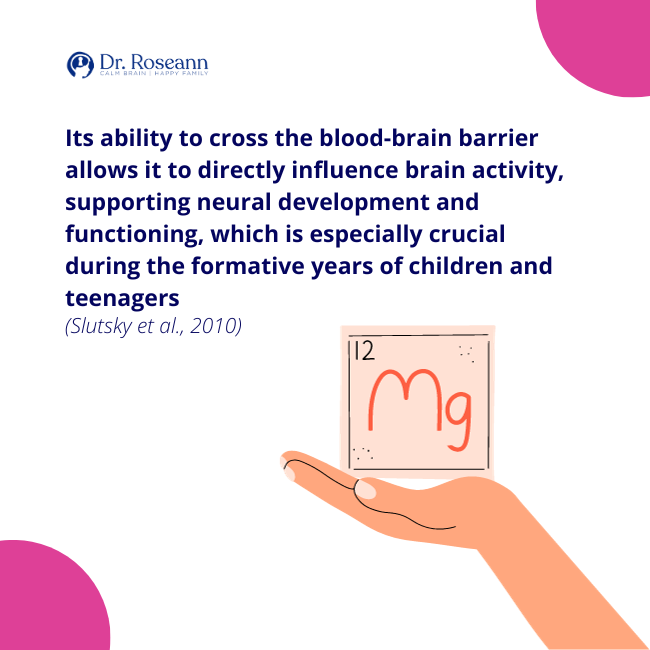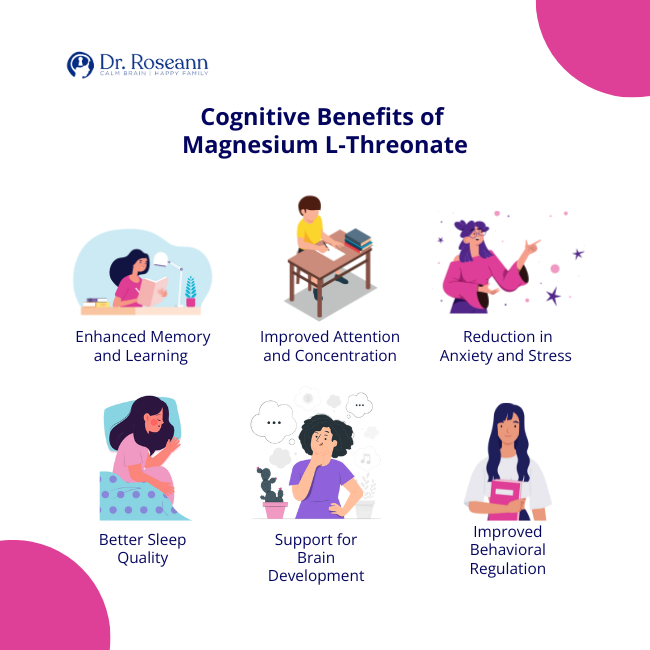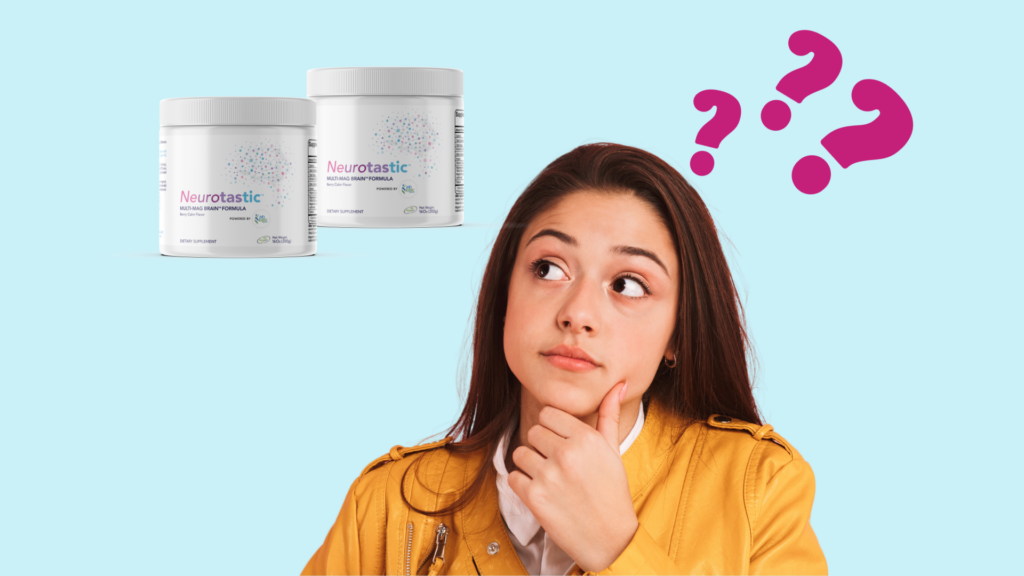As parents, we continuously seek ways to nurture our children's health and well-being, particularly when they face behavioral and mental health challenges. In this journey, one essential mineral has emerged as a game-changer: Magnesium L-Threonate.
This blog post will explore the distinctive benefits of Magnesium L-Threonate, especially for children and teens with behavioral and mental health issues, and why it could be a valuable addition to their daily regimen.
What is Magnesium L-Threonate and How is it Different from Other Forms of Magnesium?
Magnesium L-Threonate is a unique form of magnesium, bound to threonic acid, a metabolite of vitamin C. This binding makes Magnesium L-Threonate stand out from other magnesium supplements in its ability to cross the blood-brain barrier efficiently (Slutsky et al., 2010).
Unlike other forms that may primarily affect the body, Magnesium L-Threonate targets the brain, making it a potent option for improving cognitive function and brain health.
What are the Forms of Magnesium L-Threonate?
Magnesium L-Threonate is available in various forms, including capsules, powders, and liquid solutions. The choice of form depends on individual preferences and the specific needs of the child.
Capsules are convenient for controlled dosages, while powders and liquids can be easier for children who have difficulty swallowing pills.
What is Magnesium L-Threonate Good For? The Benefits for the Brain and Body
Magnesium L-Threonate has been shown to be beneficial in promoting healthy brain function and overall well-being. It plays a crucial role in numerous metabolic reactions and is vital for maintaining normal nerve and muscle function, supporting a healthy immune system, and keeping the heartbeat steady (Eby & Eby, 2010).
This form of magnesium is particularly effective in improving cognitive functions such as memory, focus, and learning. Its ability to cross the blood-brain barrier allows it to directly influence brain activity, supporting neural development and functioning, which is especially crucial during the formative years of children and teenagers (Slutsky et al., 2010).

What are Some of the Cognitive Benefits Associated with Magnesium L-Threonate Supplementation?

In the dynamic world of childhood and adolescence, where cognitive development is paramount, Magnesium L-Threonate emerges as a crucial ally. This unique supplement goes beyond conventional nutrition, targeting the very core of brain health and function. It offers a spectrum of cognitive benefits that are particularly transformative for the developing minds of children and teens.
From enhancing memory and learning to improving focus and emotional well-being, Magnesium L-Threonate is not just a supplement; it's a key to unlocking the full potential of young, vibrant brains. Let’s delve into how this remarkable mineral is setting a new standard in cognitive support for the younger generation.
Enhanced Memory andLearning
Magnesium L-Threonate is known to facilitate the strengthening of neural networks in the brain, which is crucial for memory formation and learning processes. This can be particularly beneficial for children in academic settings (Slutsky et al., 2010).
Improved Attention and Concentration
Regular intake of this form of magnesium has been linked with increased attention span and improved concentration, which can be especially helpful for children with ADHD or attention-related issues (Chen et al., 2014).
Reduction in Anxiety and Stress
Magnesium L-Threonate has a calming effect on the nervous system, which can reduce symptoms of anxiety and stress, making it easier for children to manage emotional challenges (Eby & Eby, 2010).
Better Sleep Quality
Adequate magnesium levels are associated with improved sleep patterns. Magnesium L-Threonate can contribute to deeper, more restful sleep, which is vital for cognitive function and overall well-being in children (Chen et al., 2014).
Support for Brain Development
During the crucial years of brain development, magnesium plays a key role. Magnesium L-Threonate's ability to cross the blood-brain barrier makes it particularly effective in supporting healthy brain development in children and teenagers.
Improved Behavioral Regulation
For children with behavioral issues, Magnesium L-Threonate can offer a natural way to enhance mood regulation and reduce impulsivity, contributing to more balanced behavior (Mousain-Bosc et al., 2004).
Each of these benefits contributes to a holistic approach to improving children's mental health and behavioral patterns, making Magnesium L-Threonate a valuable supplement for parents to consider.
It’s clear that Magnesium L-Threonate is more than just a health additive – it’s a catalyst for positive change in young lives. For parents seeking to support and enhance their children's cognitive abilities, emotional balance, and overall well-being, Magnesium L-Threonate has science to support its efficacy.
This unique form of magnesium, with its unparalleled ability to cross the blood-brain barrier, offers a natural, effective, and safe approach to addressing some of the most common challenges faced by children and teens today, from learning difficulties to behavioral issues. Its role in promoting healthy brain development, enhancing memory and learning, improving attention, and regulating mood, makes it a vital component of a holistic approach to child and adolescent health.
In a world where children are constantly navigating academic pressures, stress, social challenges, and a myriad of distractions, Magnesium L-Threonate provides a solid foundation for their developing brains, helping them to achieve their full potential both in and out of the classroom.
It's important to remember that while supplements like Magnesium L-Threonate offer significant benefits, they should be considered as part of a comprehensive approach to health that includes a balanced diet, regular physical activity, and emotional support. Always consult healthcare professionals before starting any new supplement regimen, especially for children and teens.
Magnesium L-Threonate can be your next step to starting with natural solution and it can help improve your child’s cognitive functioning.
Citations:
Chen, H. Y., Cheng, F. C., Pan, H. C., Hsu, J. C., & Wang, M. F. (2014). Magnesium enhances exercise performance via increasing glucose availability in the blood, muscle, and brain during exercise. PloS one, 9(1), e85486. https://doi.org/10.1371/journal.pone.0085486
Eby, G. A., Eby, K. L., & Murk, H. (2011). Magnesium and major depression. In R. Vink (Eds.) et. al., Magnesium in the Central Nervous System. University of Adelaide Press. https://pubmed.ncbi.nlm.nih.gov/29920018/
Kirkland, A. E., Sarlo, G. L., & Holton, K. F. (2018). The Role of Magnesium in Neurological Disorders. Nutrients, 10(6), 730. https://doi.org/10.3390/nu10060730
Mousain-Bosc, M., Roche, M., Polge, A., Pradal-Prat, D., Rapin, J., & Bali, J. P. (2006). Improvement of neurobehavioral disorders in children supplemented with magnesium-vitamin B6. I. Attention deficit hyperactivity disorders. Magnesium research, 19(1), 46–52. https://pubmed.ncbi.nlm.nih.gov/16846100/
Slutsky, I., Abumaria, N., Wu, L. J., Huang, C., Zhang, L., Li, B., Zhao, X., Govindarajan, A., Zhao, M. G., Zhuo, M., Tonegawa, S., & Liu, G. (2010). Enhancement of learning and memory by elevating brain magnesium. Neuron, 65(2), 165–177. https://doi.org/10.1016/j.neuron.2009.12.026
Vink R, Nechifor M, editors. Magnesium in the Central Nervous System [Internet]. Adelaide (AU): University of Adelaide Press; 2011. Available from: https://www.ncbi.nlm.nih.gov/books/NBK507264/
Are you looking for SOLUTIONS for your struggling child or teen?
Dr. Roseann and her team are all about science-backed solutions, so you are in the right place!
Grab your complimentary copy of
147 Therapist-Endorsed Self-Regulation Strategies for Children: A Practical Guide for Parents
You can get her books for parents and professionals, including: It’s Gonna Be OK™: Proven Ways to Improve Your Child’s Mental Health, Teletherapy Toolkit™ and Brain Under Attack: A Resource For Parents and Caregivers of Children With PANS, PANDAS, and Autoimmune Encephalopathy.
If you are a business or organization that needs proactive guidance to support employee mental health or an organization looking for a brand representative, check out Dr. Roseann’s professional speaking page to see how we can work together.
Dr. Roseann is a Children’s Mental Health Expert and Licensed Therapist who has been featured in/on hundreds of media outlets including The Mel Robbins Show, CBS, NBC, PIX11 NYC, Today, FORBES, CNN, The New York Times, The Washington Post, Business Insider, Women’s Day, Healthline, CNET, Parade Magazine and PARENTS. FORBES called her, “A thought leader in children’s mental health.”

She coined the terms, “Re-entry panic syndrome” and “eco-anxiety” and is a frequent contributor to media on mental health.
Dr. Roseann Capanna-Hodge has three decades of experience in working with children, teens and their families with attention-deficit hyperactivity disorder (ADHD), autism, concussion, dyslexia and learning disability, anxiety, Obsessive Compulsive Disorder (OCD), depression and mood disorder, Lyme Disease, and PANS/PANDAS using science-backed natural mental health solutions such as supplements, magnesium, nutrition, QEEG Brain maps, neurofeedback, PEMF, psychotherapy and other non-medication approaches.
She is the author of three bestselling books, It’s Gonna Be OK!: Proven Ways to Improve Your Child's Mental Health, The Teletherapy Toolkit, and Brain Under Attack. Dr. Roseann is known for offering a message of hope through science-endorsed methods that promote a calm brain.
Her trademarked BrainBehaviorResetⓇ Program and It’s Gonna be OK!Ⓡ Podcast has been a cornerstone for thousands of parents facing mental health, behavioral or neurodevelopmental challenges.
She is the founder and director of The Global Institute of Children’s Mental Health, Neurotastic™Brain Formulas and Dr. Roseann Capanna-Hodge, LLC. Dr. Roseann is a Board Certified Neurofeedback (BCN) Practitioner, a Board Member of the Northeast Region Biofeedback Society (NRBS), Certified Integrative Mental Health Professional (CIMHP) and an Amen Clinic Certified Brain Health Coach. She is also a member of The International Lyme Disease and Associated Disease Society (ILADS), The American Psychological Association (APA), Anxiety and Depression Association of America (ADAA) National Association of School Psychologists (NASP), International OCD Foundation (IOCDF).
© Roseann-Capanna-Hodge, LLC 2023










